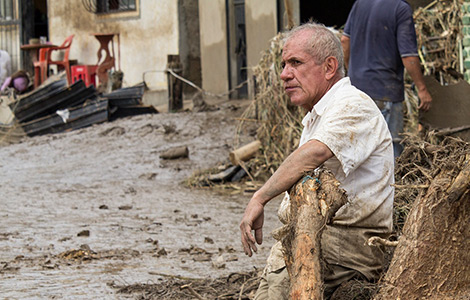Care of children & Family Court
What should I do if my child’s usual care arrangements are disrupted?
Extreme weather events might make it difficult or impossible to continue with agreed-on shared custody or care arrangements. For example, if your home has been badly affected by flooding, or if roads have been closed, you might have to make a temporary change to previous childcare arrangements.
The overriding consideration in care arrangements should always be the best interests of the child. So, if you have an agreement about the days you normally take care of your child, but your home is unsafe because of flood damage, you might need to temporarily change where you are staying, or who is looking after them.
If your home is safe, but road closures mean travel to and from your home is delayed, you might need to extend the number of days your child stays at each household, to minimise unnecessary travel time.
In all situations, you use common sense to decide with the other caregivers about what is best for the child.
What if court-ordered care arrangement is disrupted?
If the usual care arrangements for your child includes court-ordered supervised contact, and extreme weather events mean the terms of that contact can’t be followed, you can apply to court for an urgent variation to the arrangement.
What if Oranga Tamariki are involved in my child’s care arrangements?
If you’ve had a family group conference or there is a court order in place, you should contact Oranga Tamariki about any potential changes to care arrangements as soon as possible.
What if we can’t agree how to alter the care arrangement in place?
If you and the other caregivers can’t come to a decision together, family mediation (sometimes called Family Dispute Resolution) can help you come to an agreement. This service can be done remotely. You can find a list of providers in your area on the Ministry of Justice website, here, or go to justice.govt.nz and search “Service provider search tool”.
If you need to resolve the care arrangement decision urgently, you may need to get a court order. A lawyer at a Community Law Centre can give you advice about this by email, over the phone or in person. See: “Parenting Orders” in the Community Law Manual for more information.
What if I have a Family Court hearing but and I can’t attend?
If you have a Family Court hearing about shared parenting, day-to-day care or a contact dispute that you won’t be able to attend, you can contact your lawyer or the Court case manager for information about attending remotely. You should be able to attend by video if an extreme weather event has disrupted your home or travel.
What if I am experiencing family violence and I have nowhere else to go?
Family violence refuges and shelters, like Women’s Refuge, remain open in severe weather events.
Urgent issues, like family violence proceedings, protection orders and urgent variations to parenting orders, will still be considered by the courts, remotely if necessary.
For more information about your legal options if you’ve experienced family violence, see: “Family Violence” in the Community Law Manual for more information.
Other helplines include:
- Family violence information line
- Phone: 0800 456 450
- Website: www.areyouok.org.nz
- Womens Refuge
- Website: womensrefuge.org.nz
- Shine National Helpline
- Phone: 0508 744 633
- Website: www.2shine.org.nz
- Shakti
- Shakti Community Council is a non-profit organisation serving migrant and refugee women of Asian, African and Middle Eastern origin.
- Phone: 0800 742 584
- Website: www.shaktiinternational.org.nz
- Hey bro helpline
- Supporting men to be free from violence
- Phone: 0800 439 276
- Website: www.2shine.org.nz
- Korowai Tumanako
- Supporting people to stop engaging in sexual harm
- Website: www.korowaitumanako.org
- Elder Abuse Helpline
- Phone: 0800 32 668

